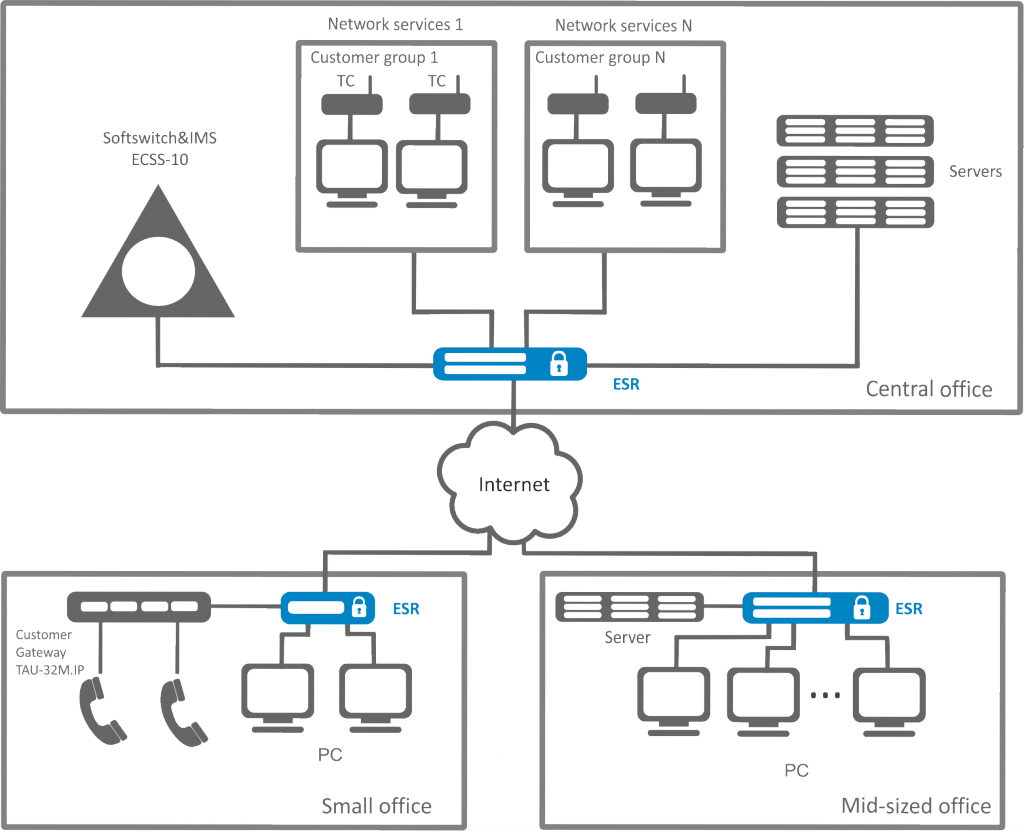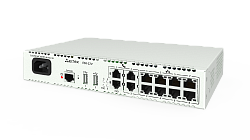Subscribe
You will receive on your e-mail all the news about the product, updating software and documentation!
Service gateway ESR-12V
Overview
Specifications
Reviews
- The solution for small and mid-sized offices
- FXS ports for analogue phone connection
- FXO port for connection redundancy
- Firewall and router functionality
ESR-12V service router is designed to use in corporate networks for small and mid-sized offices connection.
The Firewall and router functionality provides security of different types of Internet connection.
ESR-12V has FXS ports for connection of up to 3 analogue phones to a corporate network without gateways. FXO port allows redundancy of phone connection via analogue line in case of lack of connection to central PBX.
Diagram of application in corporate network

VPN Server
– L2TP
– PPTP
– OpenVPN
Tunneling
– GRE
– IPIP
– L2TPv3
L2 functions
– Packet switching (bridging)
– LAG/LACP 802.3ad
– VLAN 802.1Q
L3 functions (IPv4/IPv6)
– SNAT, DNAT, Static NAT addresses translation (IPv4 only)
– Static routes
– Dynamic Routing protocols: RIPv2, OSPFv2, BGP, OSPFv3
– VRF Lite
– PBR
– Prefix-List
IP addressing management (IPv4/IPv6)
– Static addresses
– DHCP client
– Embedded DHCP server
– DHCP Relay
Quality of Service (QoS)
– Up to 8 priority queues on port
– L2 and L3 traffic prioritization (802.1p, DSCP, IP
Precedence)
– RED, GRED queue overload management
– Port Priority Assignment, VLAN
– Priority remarking means
– Policing
– Bandwidth shaping
– Hierarchical QоS
– Session marking
Network reliability means
– VRRP v2,v3
– Load balancing on WAN interfaces, data flow
redirection
Network security functions
– Network interfaces zoning
– Zone isolation, Firewall, data filtering rules
– IPsec - encrypted tunnel
– Encryption of connections (DES, 3DES, AES, Blowfish,
Camellia)
– Message authentications (MD5, SHA-1, SHA-2)
– Access Control Lists (ACL) based on MAC, IP
Monitoring and management
– Standard SNMP MIB support
– Access level management
– Authentication via local user database, RADIUS,
TACACS+, LDAP.
– Protection from configuration errors, configuration
recovery. Reset configuration to default settings.
– CLI management interfaces
– Syslog
– System resources usage monitor
– ping, traceroute (IPv4/IPv6)
– Software updating, upload and download of
configuration via TFTP, SCP, FTP
– NTP
– Netflow v5/v9/v10
– Local management - console RS-232
– Remote management (IPv4/IPv6) - Telnet, SSH
Physical characteristics and environment conditions
– Power supply source: 220V+-20%, 50 Hz AC
– Max. power consumption: 9 W
– Operating temperature from 0 to +40°С
– Storage temperature from -40 to +70°С
VoIP protocols
– SIP
Voice codecs
– G.711 a-law, µ-law
– G.723.1
– G.729 (A/B)
Fax transmission
– T.38 UDP Real-Time Fax
– a-law, µ-law G.711 pass-through
Voice standards
– VAD (Voice Activity Detection)
– CNG (Comfort Noise Generation)
– AEC (echo cancellation, G.165, G.168
recommendations)
DTMF
– DTMF Signal detection and generation
– Transmission by INBAND, RFC 2833, SIP INFO
Value Added Services
– Call Hold
– Call Transfer
– Call Waiting
– Call Forwarding on Busy (CFB)
– Call Forwarding on no Reply (CFNR)
– Call Forwarding Unconditional (CFU)
– Caller ID
– Caller ID Restriction (CLIR)
– Hotline/Warmline
– Call Group
– 3-Way conference
VoIP features
– Inner connection switching
– Operation without SIP server
– Flexible numbering plan
– Port configuration profiles
– Settings apply without a reboot
– IMS (3GPP TS 24.623) support for Hold, CW, 3Wayconference, Hotline service management
Quality of Service (QoS)
– Diffserv and 802.1p assignment for SIP and RTP
packets;
– Ingress traffic prioritization according to DSCP and
802.1p
Types of connections
– Static IP address
– DHCP client
– L2TP
– PPTP
– OpenVPN
Tunneling
– GRE
– IPIP
– L2TPv3
L2 functions
– Packet switching (bridging)
– LAG/LACP 802.3ad
– VLAN 802.1Q
L3 functions (IPv4/IPv6)
– SNAT, DNAT, Static NAT addresses translation (IPv4 only)
– Static routes
– Dynamic Routing protocols: RIPv2, OSPFv2, BGP, OSPFv3
– VRF Lite
– PBR
– Prefix-List
IP addressing management (IPv4/IPv6)
– Static addresses
– DHCP client
– Embedded DHCP server
– DHCP Relay
Quality of Service (QoS)
– Up to 8 priority queues on port
– L2 and L3 traffic prioritization (802.1p, DSCP, IP
Precedence)
– RED, GRED queue overload management
– Port Priority Assignment, VLAN
– Priority remarking means
– Policing
– Bandwidth shaping
– Hierarchical QоS
– Session marking
Network reliability means
– VRRP v2,v3
– Load balancing on WAN interfaces, data flow
redirection
Network security functions
– Network interfaces zoning
– Zone isolation, Firewall, data filtering rules
– IPsec - encrypted tunnel
– Encryption of connections (DES, 3DES, AES, Blowfish,
Camellia)
– Message authentications (MD5, SHA-1, SHA-2)
– Access Control Lists (ACL) based on MAC, IP
Monitoring and management
– Standard SNMP MIB support
– Access level management
– Authentication via local user database, RADIUS,
TACACS+, LDAP.
– Protection from configuration errors, configuration
recovery. Reset configuration to default settings.
– CLI management interfaces
– Syslog
– System resources usage monitor
– ping, traceroute (IPv4/IPv6)
– Software updating, upload and download of
configuration via TFTP, SCP, FTP
– NTP
– Netflow v5/v9/v10
– Local management - console RS-232
– Remote management (IPv4/IPv6) - Telnet, SSH
Physical characteristics and environment conditions
– Power supply source: 220V+-20%, 50 Hz AC
– Max. power consumption: 9 W
– Operating temperature from 0 to +40°С
– Storage temperature from -40 to +70°С
VoIP protocols
– SIP
Voice codecs
– G.711 a-law, µ-law
– G.723.1
– G.729 (A/B)
Fax transmission
– T.38 UDP Real-Time Fax
– a-law, µ-law G.711 pass-through
Voice standards
– VAD (Voice Activity Detection)
– CNG (Comfort Noise Generation)
– AEC (echo cancellation, G.165, G.168
recommendations)
DTMF
– DTMF Signal detection and generation
– Transmission by INBAND, RFC 2833, SIP INFO
Value Added Services
– Call Hold
– Call Transfer
– Call Waiting
– Call Forwarding on Busy (CFB)
– Call Forwarding on no Reply (CFNR)
– Call Forwarding Unconditional (CFU)
– Caller ID
– Caller ID Restriction (CLIR)
– Hotline/Warmline
– Call Group
– 3-Way conference
VoIP features
– Inner connection switching
– Operation without SIP server
– Flexible numbering plan
– Port configuration profiles
– Settings apply without a reboot
– IMS (3GPP TS 24.623) support for Hold, CW, 3Wayconference, Hotline service management
Quality of Service (QoS)
– Diffserv and 802.1p assignment for SIP and RTP
packets;
– Ingress traffic prioritization according to DSCP and
802.1p
Types of connections
– Static IP address
– DHCP client






